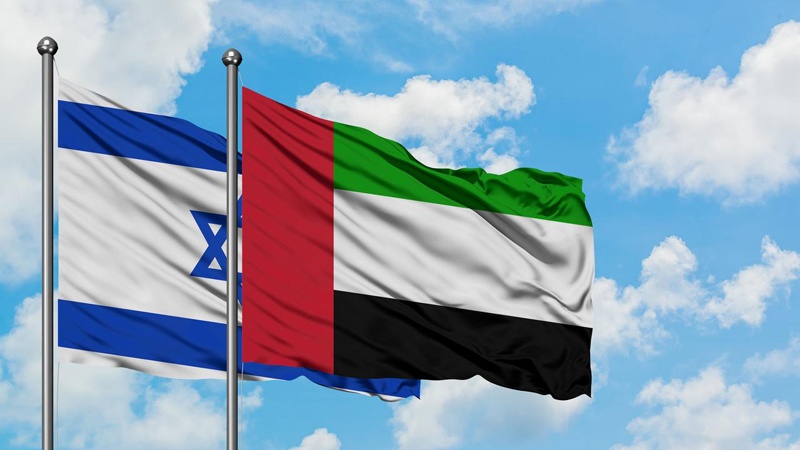

DUBAI: The president of the United Arab Emirates scrapped an economic boycott against Israel, allowing trade and financial agreements between the countries in another key step towards normal ties, the UAE's state news agency reported yesterday. Israel and the UAE said on Aug 13 they would normalize diplomatic relations in a deal brokered by US President Donald Trump that reshapes the order of Middle East politics from the Palestinian issue to the fight against Iran.
President Khalifa bin Zayed Al-Nahyan issued a decree abolishing a boycott law as part of "the UAE's efforts to expand diplomatic and commercial cooperation with Israel, leading to bilateral relations by stimulating economic growth and promoting technological innovation," the WAM news agency said.
The announcement came as Israeli flag carrier El Al Israel Airlines Ltd prepared to operate the country's first direct flight between Tel Aviv's Ben Gurion Airport and the UAE's capital, Abu Dhabi. An Israeli government delegation and top aides to Trump are due to travel on the flight on Aug 31, a US official said.
Israeli Prime Minister Benjamin Netanyahu tweeted a screen-shot of a news report on the flight Friday, saying: "This is exactly what peace for peace looks like." Jared Kushner, top aide and son-in-law to US President Donald Trump, has confirmed he will be on the flight, alongside National Security Advisor Robert O'Brien. Earlier this week, Netanyahu's office said National Security Advisor Meir Ben Shabbat will lead the "professional delegation".
Before the Aug 13 deal can be officially signed, details must be agreed on issues such as the opening embassies, trade and travel links. Israel's Channel 13 TV said bilateral trade could initially be worth $4 billion a year, a figure it said could soon be tripled or quadrupled. Government officials did not immediately confirm that estimate. Officials from the two countries recently said they were looking at cooperation in defense, medicine, tourism and technology.
In Tel Aviv, Israeli Agriculture Minister Alon Schuster said Israel was working on potential joint projects that could help improve the oil-rich Gulf nation's food security, such as water desalination and crop cultivation in the desert. "With their money and our experience, we could go a long way," he told a local radio station in an interview broadcast on Friday. "Our job is to ensure that this fantastic mood is turned into reality."
Due to the presidential decree announced yesterday, UAE citizens and businesses will be free to do business with Israel, including trade and financial transactions. "Following the abolition of the Israel boycott law, individuals and companies in the UAE may enter into agreements with bodies or individuals residing in Israel or belonging to it by their nationality, in terms of commercial, financial operations, or any other dealings of any nature," WAM quoted the decree as saying.
Still, Israel and the UAE do not yet have official air links, and it was unclear whether tomorrow's El Al flight would be able to fly over Saudi Arabia - which has no official ties with Israel - to cut down on flight time. Netanyahu has said Israel is "working to enable direct flights over Saudi Arabia", a US ally close to the Emirates, but with no official ties with the Jewish state. In May, an Etihad Airways plane flew from the UAE to Tel Aviv to deliver supplies to the Palestinians to help fight coronavirus, marking the first known flight by a UAE carrier to Israel.
But amidst all the diplomatic back-slapping, the Israel-UAE accord faces its first hiccup: The possible sale of American F-35s to Abu Dhabi that could challenge the Israeli technological edge in the Middle East. Netanyahu has denied reports that the UAE deal hinges on the sale of US F-35 stealth warplanes to the Emirates, saying he opposes a move that could reduce Israel's strategic edge in the region. "This deal did not include Israel's acceptance of any arms deal," he said Monday.
Ever since the 1960s, the United States has guaranteed to maintain Israel's "qualitative military edge" in the region. The policy was enhanced two years ago with a law that Washington must ensure, when selling weapons to another country in the Middle East, that Israel retains the ability to defend itself if the arms were to fall into the wrong hands.
Israel has already received a first consignment of F-35s, a fighter also coveted by Gulf powers including the UAE. Abu Dhabi "has indicated that it wants the F-35. I think the first time was six years ago, so this is something on the table," the UAE minister of state for foreign affairs, Anwar Gargash, told US think tank the Atlantic Council.
"Now the whole idea of, you know, a state of belligerency or war with Israel will no longer exist. So I think it should be… easier," he said. Experts believe a deal can be struck to the satisfaction of both Israel and the UAE, and ultimately Saudi Arabia, a longtime customer of US armaments. - Agencies

